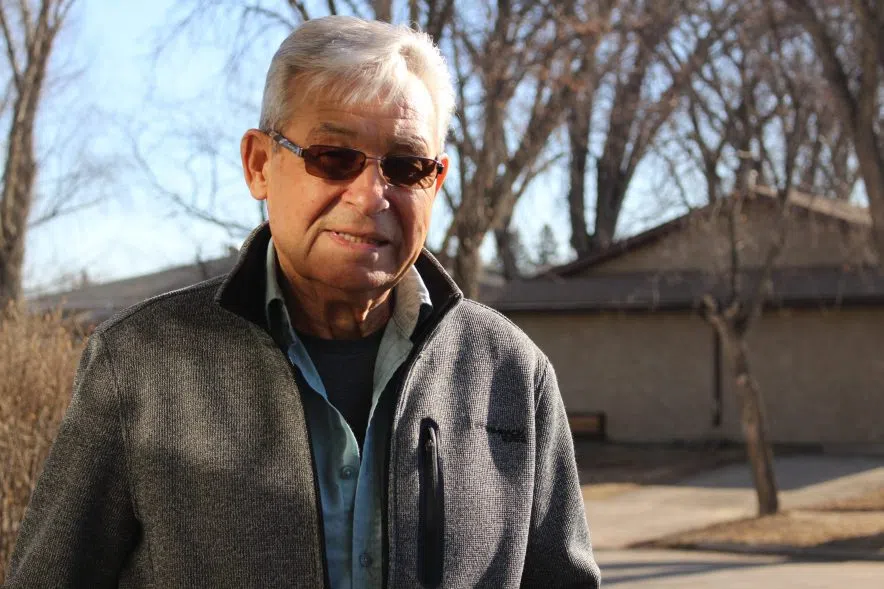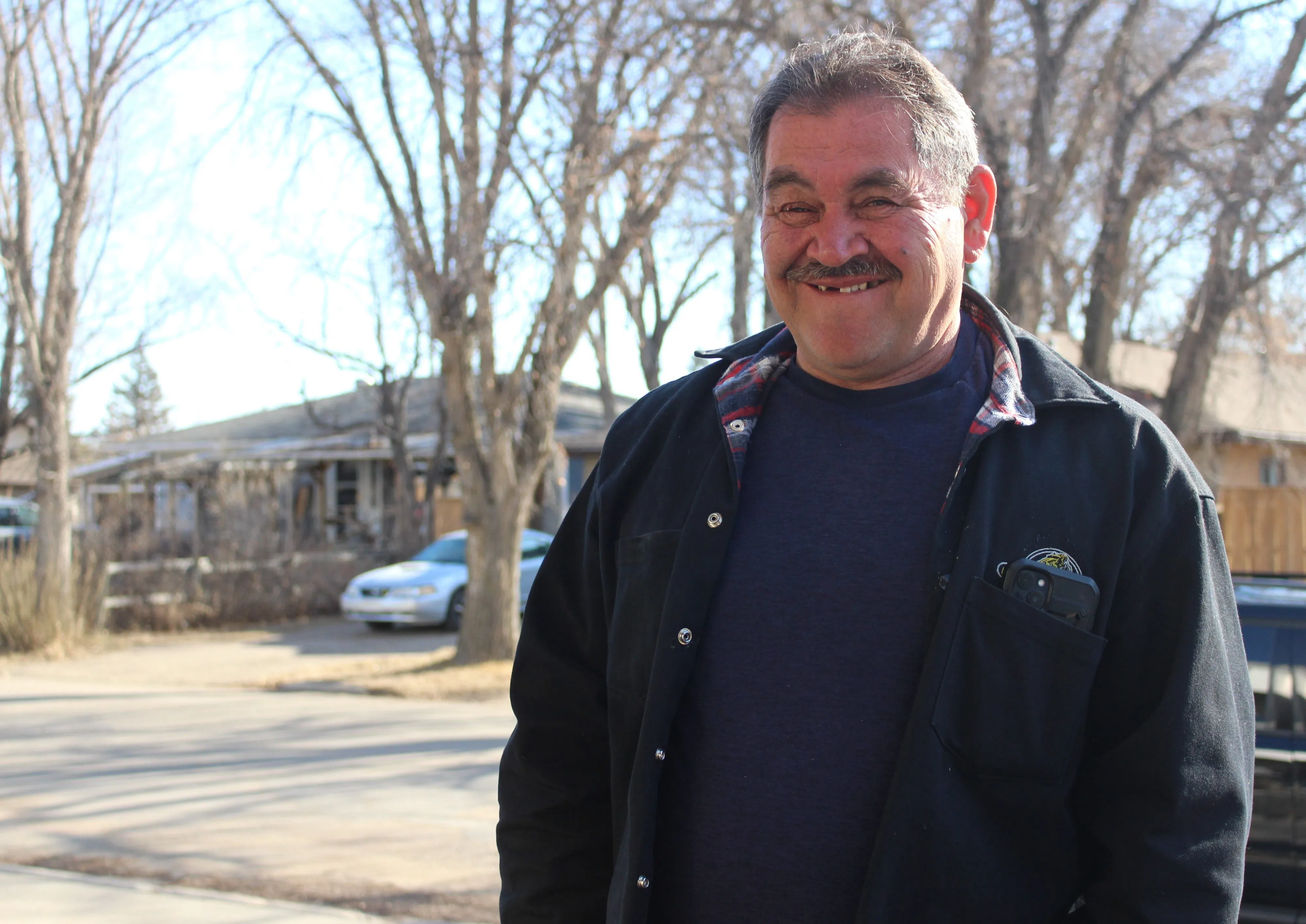By Julia Lovett-Squires
David Chartrand had been speaking for an hour and a half when Crown Prosecutor James Fyfe lodged an objection.
The President of the Manitoba Métis Federation (MMF) had come to Meadow Lake Provincial Court from Winnipeg to testify in support of Oliver Poitras, one of three Métis men who were charged with unlawfully hunting and fishing.
Under section 35 of the Constitution Act, 1982, First Nations have rights to hunt and fish throughout Saskatchewan, but Métis rights are recognized only in specific areas.
Read more:
- Métis housing corporation to develop low-income units on civic centre site
- Métis Nation-Sask. sees Supreme Court ruling as monumental win
- Survivors of Sask. boarding school to get millions in proposed settlement
The trial outcome will help determine whether or not Métis people in Saskatchewan have the right to hunt, fish, trap and gather food throughout the whole province.
Chartrand, a longtime politician and activist, had been speaking at length about what it was like to grow up poor in Duck Bay, MB, where it was a hard life but one he cherished.
When his testimony veered into the political realm, Fyfe asked the court, presided over by Judge Bryce Pashovitz, what the relevance was and asked that Chartrand keep to the task at hand.
However, Defence Counsel Kathy Hodgeson-Smith rebutted that Chartrand’s testimony — all of it — went to the heart of the case, which is: who are the Métis, how do they govern themselves, what are their customs, where is that homeland and how do they relate to it.
“This is the story of the Métis. This is the Métis people speaking about who they are,” she said. “I’m not sure what this case would be about if it wasn’t about who the Métis people are, who they think they are, what their relationship is to the land and resources.”
While on the stand, Chartrand said, “This is our homeland… there’s no doubt about that.”He is one of 35 or so community witnesses expected to speak about the life of the Métis during the trial over the next few weeks.

Oliver Poitras. (meadowlakeNOW)
The other two men at the centre of the test case are Warren Boyer and Harold St. Pierre.
Poitras and Boyer were convicted in 2018, but the Saskatchewan Court of Appeal granted their appeal in 2022, ordering a new trial.
St. Pierre, who was charged with hunting without a licence near Yorkton, was added as a defendant for the new trial. The Court of Appeal said the men could pursue their constitutional rights if they could prove their affiliation with the historic Métis Nation.
The first day of the trial began with opening statements from Fyfe, who said the procedure will be “unusual.”
“The trial you’re going to hear isn’t a situation where the Crown puts in its evidence…that’s the bulk of what you hear and defense cross examines defense witnesses and ultimately, you make a decision on guilt or innocence,” he said.
“Beyond the Crown calling evidence, the only exhibit — at least in terms of putting in the crown’s case are agreed statements of fact.”
Throughout the trial, which is expected to be presented in two parts, the court will also hear about Métis people in different areas of what is now Saskatchewan.
“It’s always important to bear in mind…come back to the ultimate issue that’s before you which is whether Métis people historically harvested in the areas where the accused were charged prior to European control,” said Fyfe, referring to Alcott Creek, about an hour east of Meadow Lake and Chitek Lake about a half hour north of Spiritwood.
The Crown went on to say that historically not all Métis were highly mobile, a fact later disputed by the MMF president.
“Some Métis were definitely highly mobile, like the bison hunting Red River Métis in the south on the prairies. They were highly mobile, at least prior to the disappearance of the buffalo, but as mobile as they were, their orientation was westward on the prairies and southwards into the United States,” he said.
“It wasn’t northerly. I don’t think you’re going to hear evidence that those buffalo-hunting Métis were coming up to Northwest Saskatchewan to hunt moose.”
Of the northern Métis, Fyfe referenced an expert witnesses in a previous trial who said they weren’t travelling south, but rather located around fur trade posts, worked for the Hudson’s Bay Company and their primary food source was fish.
He said others worked as freighters who carted goods.
“Their work took place on established trails,” he said, adding they didn’t go into the bush.
“Their job was to transport goods, not harvest animals.”
‘Recognition of Section 35 rights is an act of reconciliation’
During Hodgson-Smith’s opening, she spoke of this case as a “trial afresh” for all three defendants.
“Aboriginal rights are derived from Indigenous people’s occupation of their traditional lands prior to effective Crown control,” said Hodgson-Smith.
Referring to a previous case file, the defence quoted that when settlers arrived, Indigenous societies had already been there for centuries.
“Recognition of Section 35 rights is an act of reconciliation. The goal of the honour of the Crown is reconciliation.”
In preparing the court for what’s to come, the lawyer said community witnesses from across western Canada will be called upon to recount their upbringing, kin, traditions, cultural celebrations and identity.
“Evidence of cultural similarity will be in both the historic context and the modern one,” she said.
“The cultural realities that bind the Métis people together do not fray because the modern use of the traditional territory has diminished … that the modern Métis people continue to be highly mobile and continue to move throughout the traditional territory of their ancestors.”
During his time on the stand, the court learned that Chartrand was raised by a single mother along with his seven other siblings and though they grew up poor, they lived a “solid, unified life” as a family.
“We actually lived off the land a lot. I started hunting when I was very young; all of us did,” Chartrand said.
The MMF president said in addition to hunting and fishing, they also had a garden and without living off the land, they would’ve often been hungry.
“In our culture, everything’s shared. So, when we go out to hunt and harvest, whether we kill a deer or a moose, it’s shared amongst the entire families.”
As his testimony progressed, it spanned the breadth of how the community and culture worked and how, regardless of where the Métis people are, there are commonalities throughout the traditional lands — which stretched from Manitoba to the Rockies.

Alcott Creek, about an hour east of Meadow Lake, is one of the locations where the defendants were harvesting. (meadowlakeNOW)
“We just knew each other … like even here, Your Honour, I wore this vest to respect this court,” he said, referring to the beaded story of his life that covered the front and back of the tan garment.
“It’s not just a bunch of fancy colours, this is done by an expert that made this vest. In front is the story of me — you’ll see a lot of different things in the front; in the back is the story of my mom.”
As other cultures like the Scottish Highlanders could tell which clan a person belonged to based on their tartan, so too did the vests act as identifiers.
“Our people throughout history, go back as far as you want, used to know each other just by looking at the beadwork — who you were, where you belong, where you live.”
During the roughly five-hour-long testimony, Chartrand explained as a government, the MMF is not only extremely rigorous and strict with citizenship, but they are also strict with hunting laws and said conservation is fundamental.
Last year, the Canadian government and the MMF signed a treaty. Chartrand said now the word is getting out that the borders across the prairies no longer apply and people are finding their way home.
“There’s already 4,000 citizens that have applied for a citizenship card that don’t live in Manitoba,” he said.
On cross-examination, Fyfe asked the witness to recount his hunting background. Chartrand said he began hunting at the age of eight and got his first rifle in his late teens.
When asked about how many of the citizens hunt, Chartrand was blunt: Hunting is on the decline.
“Harvesting is something that is more treasured in our culture,” he said.
“Some of our citizens get cards — harvesting cards — just for pride. They don’t go hunting but say — ‘I have the right to hunt, I have the right to harvest and feed my family.’”
Read more:











